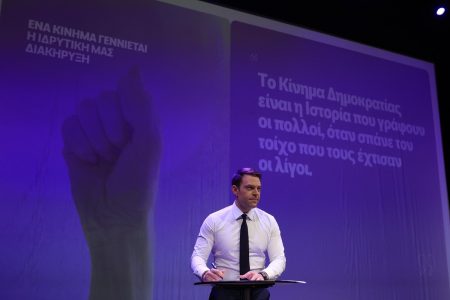The image, the knowledge we have about the Revolution of 1821 comes to record the poll conducted on behalf of the Center for Liberal Studies – KEFIM. In particular, for the character and the protagonists of the Revolution, the role of the Great Powers, the benefit from the loans that the newly formed Greek state received, etc.
The poll, the third in a row conducted by KEFIM from 2019 onwards, conducted by the company MARC from November 30 to December 5, is nationwide and has a sample of 1,211 people.
It is part of the educational program “200 Years since the Liberal Revolution”.
As for the main findings of the poll, they are as follows: first, “the Revolution of 1821 is a common place of reference that unites all Greeks, regardless of demographic characteristics, educational level, ideological position, political identity”, the Center points out, which at the same time emphasizes the universal acceptance enjoyed by the national character of the Revolution (91.2%).
The most famous protagonists of the Revolution are, in turn, Th. Kolokotronis, G. Karaiskakis and L. Bouboulina – with an increase of more than 10 points the latter. At the same time, the positive contribution of the Friendly Society (90%), the Greeks (84.4%) and the island shipowners (83.8%) in the outcome of the Struggle is recognized, more than other factors.
Beyond that, “the Liberal character of the Revolution is now second in popularity after the National”, with the Socialist moving to third place, while during the last three years there has been a significant increase in the number of citizens who recognize the Liberal (from 52.9% in 2019, to 58.4% in 2021) and Democratic (from 40.8% to 46.2%) character of the Revolution “. In addition, 9 out of 10 Greeks positively evaluate the role of Adamantios Korais, the father of Greek liberalism in the successful outcome of the Revolution.
Regarding the role of the Great Powers in the outcome of the Struggle, 38.9% of Greeks believe that Russia had the most positive contribution, with France (20.7%) and Great Britain (19.7%). ) to follow. Compared to the first poll in 2019, Russia and Austria show a slight downward trend, while Great Britain and France are somewhat upward (it is clarified that the poll was conducted before the start of the Russo-Ukrainian war).
At the same time, 4 out of 10 converge on the positive role of external loans and 3 out of 10 on the negative. The answers to the decisive cause of the positive outcome of the Greek Revolution are also divided: according to 58% this was the military success of the revolutionaries, the intervention of the Great Powers is opposed by 34%.
Also, in the question, “myth or truth the secret school?”, 70.5% of the respondents believe that it is true, a view that is not shared by 23.8%. While in the question, if, indeed, the Revolution started on March 25 at Agia Lavra Monastery, 43% agree that, indeed, the Revolution started from there, while 41.7% say that it is a myth.
The 200th anniversary was, however, an opportunity to refresh our historical knowledge, as the poll shows that half of Greeks say that during 2021 they read and learned more about 1821, with television shows (28.4 %), books (18.6%) and the internet (16.9%) to be among the most important sources of information.
About half say they know the history of the Greek Revolution well, yet only 1 in 10 agree that their fellow citizens know it just as well.



